Step 1: Google It!
A political leader in South Africa makes the ultimate branding mistake, forgetting to Google the name for her new political party. However, what happened afterward is truly remarkable.
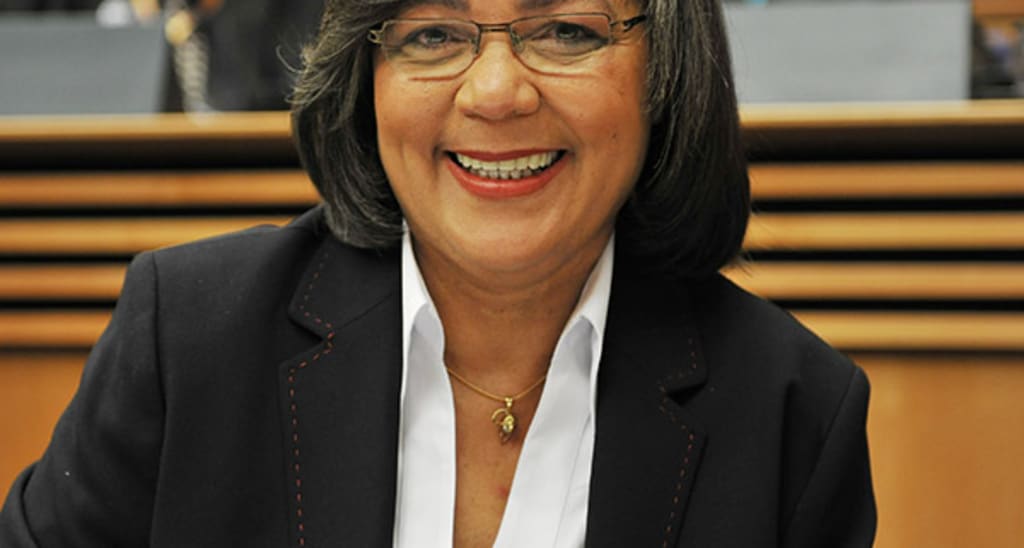
It is Branding 101 in the modern world. Say you want to name your new product? Say you need to come up with a name for your new small business? Say you have the desire to create an organization to help those in need? What is the absolute first thing that you need to do? Well, any marketing expert worth paying anything to, any marketing textbook, heck, any freshman marketing student, would tell you exactly the same thing: Google your possible choices!
That is why this story from across many miles from the world of South African politics has resonance for all who might be in the position to have to develop names for their products or even for their entire ventures. It is no doubt a small story, and it is one where happily, the organization that is really being impacted by a colossal branding blunder that they had absolutely nothing to do with has actually benefited from the confusion in the minds of many in South Africa. However, this tale should be a reminder to all in the world of marketing and advertising of one unmistakable truth: Google is your friend—use it!
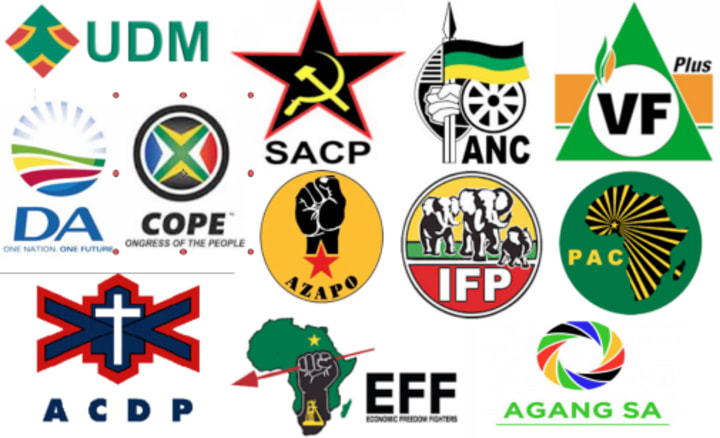
A total of 13 political parties are represented in the South Africa in a nutshell: It's complicated!
So let's begin with a look at the state of political parties in South Africa. The state of political affairs in the country can be summed-up in a nutshell: It's complicated! Unlike the overwhelmingly two party system we see dominating politics in the United States, creating the "Red vs. Blue," "Democrat vs. Republican," "Good vs. Evil" (depending on which party you personally support) that we have seen predominate American politics for a century and a half. South Africa is quite the opposite, as its politics more resemble the snack aisle at your local Walmart Super Center with choices aplenty and something for everyone's tastes—no matter what that might be!
According to A Guide to South African Political Parties, while the African National Congress holds a majority of the 400 seats in the country's National Assembly, a position it has maintained since South Africa's transition to democracy in 1994 under the legendary leader, Nelson Mandela, underneath the surface, there literally is a political party for everyone!
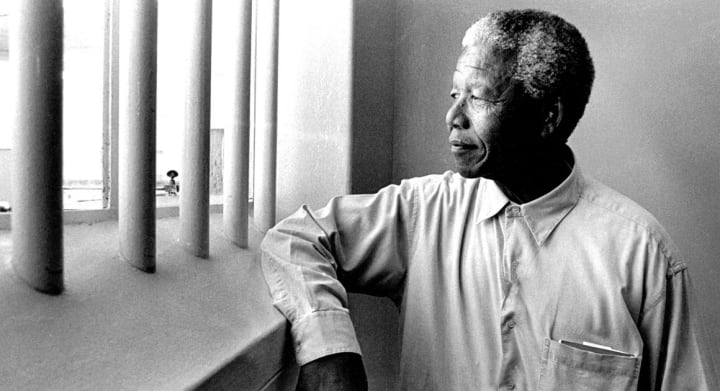
Nelson Mandela (1918-2013)
Today, there are a total of thirteen political parties that hold seats in the South African National Assembly—with sixteen others having run candidates in the last national election for those representative positions! In fact, according to the national Electoral Commission of South Africa, their latest numbers show that there are a grand total of 275 political parties operating at the national level. And if you think that's confusing (can you imagine "debates?"), matters get even more confounding on the provincial and local levels. All told, the official national elections agency currently recognizes (as of November 2019), a whopping 589 political parties operating in the country!
Well, now let's make that 590 political parties! Patricia de Lille is a prominent politician in the country, having served as mayor of Cape Town and the leader of the Democratic Alliance political party on the national level. However, she recently announced that she was leaving her former party and creating her own political group, with noble aims and ambitions to actively compete across all of South Africa in the upcoming (January 2019) national elections.
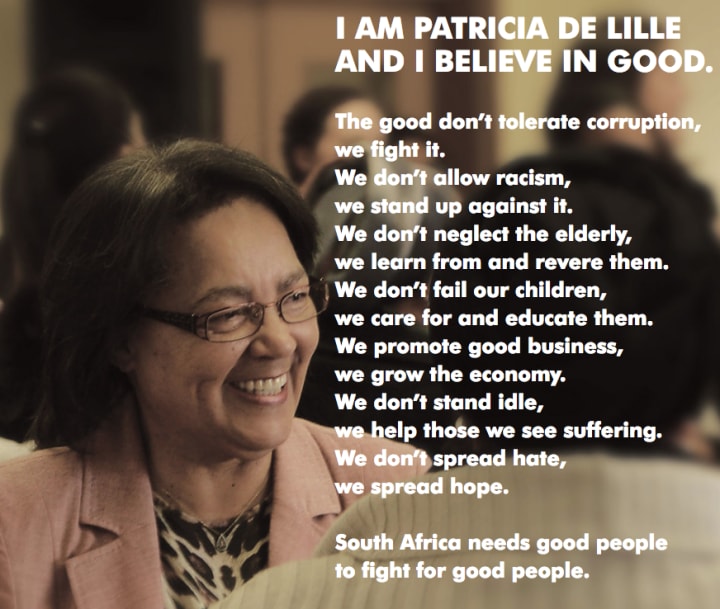
Patricia de Lille's philosophy for her new political party (From http://www.forgood.org.za/).
And then they also turn to the current tactic of asking the "man or woman on the street" what they thought about the political development. If you simply substituted names, parties, dress, and the cars passing by, you might think you were watching coverage of an American political story, not one from South Africa, literally half a world away!
Patricia de Lille notably did not announce an official name for her new political party, but her new group's branding clearly and consistently—which is good—used the phrase "for good" in identifying itself. As can be seen in the photo below at the press conference announcing the formation of the new political party, de Lille stood by signs using the phrase—and also giving the web address (http://www.forgood.org.za/). In their social media, they shared the "for good" branding quite clearly. If not a name, it was a darn good slogan! However, being that it was their online identity, one can reasonably presume that "for good" was intended to be central to their branding and, in some form or fashion, was to be in the new political party's name.
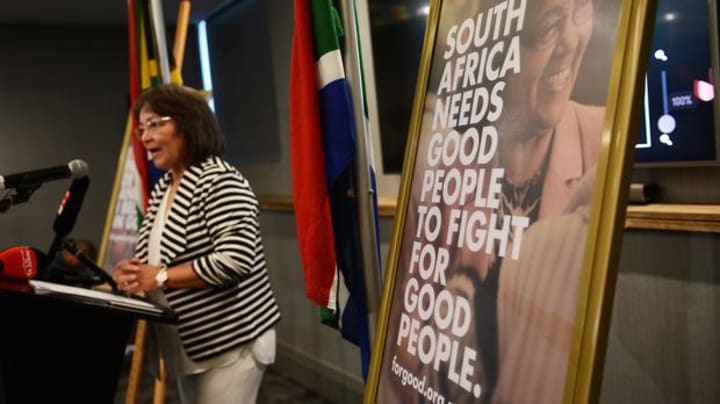
Patricia de Lille at November 2019 press conference announcing formation of her new party.
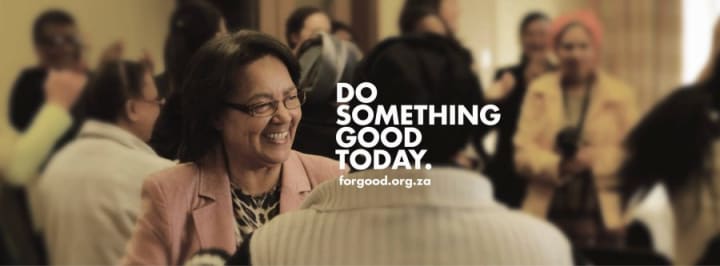
And so here's where the story becomes a "lesson learned" for marketers all around the world. It turns out that there was already an organization—in fact a very prominent one in South Africa with the name "For Good" and, as anyone with web literacy would know, the same web address, just with a different extension (https://www.forgood.co.za/).
Needless to say, this meant that de Lille's new party announcement garnered as much, if not more, attention for the fact that obviously there had not been even the rudimentary level of web research done on the fundamental question that is asked at every meeting concerning branding a product, labeling a service, or naming a business/organization: is someone else using this?
Forgood (as they chose to spell it), based in Dunkeld, South Africa, is an innovative online platform that, as the organization whose mission is to connect those wanting to donate their time, money, and goods to those in need within South Africa. As the organization describes itself in its About Us page:
Forgood is an online platform that connects passionate people with needy organisations. It is a social market place where skills, goods, services and information can easily be offered and asked for. We are about matchmaking—for good. Our mission is to create 100,000 social citizens. We aim to make doing good easy, fun and free.
Of course, in the age of social media, it did not take long for those on the Internet to spot what had happened. In fact, just moments after de Lille made her announcement about her new political initiative, Twitter users almost immediately picked-up on the duplicate name issue—calling out de Lille (also referred to as "Aunty Pat")—on social media. Even Forgood itself got into the action on the same day, retweeting the intrepid members of the Twitterverse who spotted the branding issue immediately on its organization's official Twitter account, @forgoodSA.
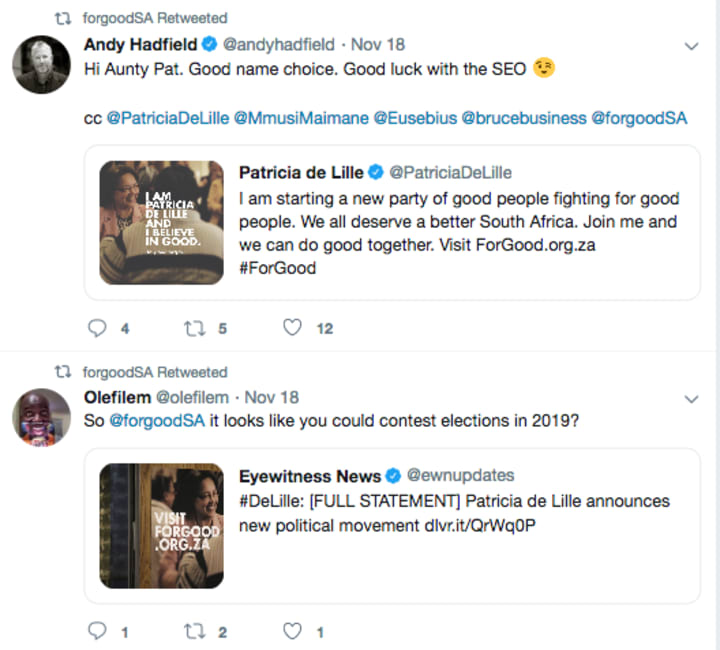
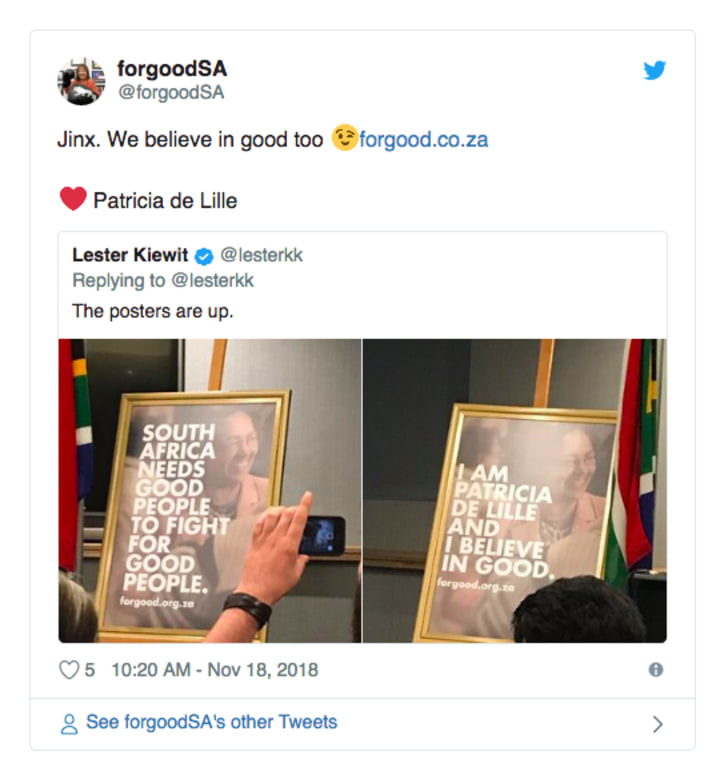
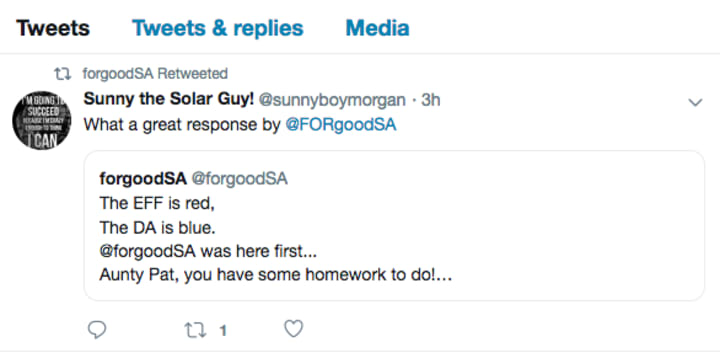
The story was soon picked up by media outlets in South Africa, who saw an interesting twist in that the branding of de Lille's new political party as "For Good" was obviously treading squarely on the turf of the charitable "Forgood" organization. As reported in the South African edition of Business Insider, Andy Hadfield, CEO of Forgood observed, "We think this shows it is really important to Google competitor names before you launch projects," but he added that his social enterprise was "going to have some fun with it."
It's indeed great to see how both the politician and the charitable organization are working together to help the "Forgood" platform capitalize on the branding confusion from the marketing misstep to drive more traffic and interest to them. All credit to "Aunty Pat" for doing so, even though she promises the name of her new political movement will be announced shortly, maintaining that: "Forgood is not the name of the party. It is a call to action for good South Africans to join a movement for good."
Patricia de Lille has since allowed a photo of her posing in boxing gloves to be used as Forgood's (the social enterprise) Twitter profile pic. That was just the beginning of a beautiful relationship between the two meanings of "for good" in South Africa.
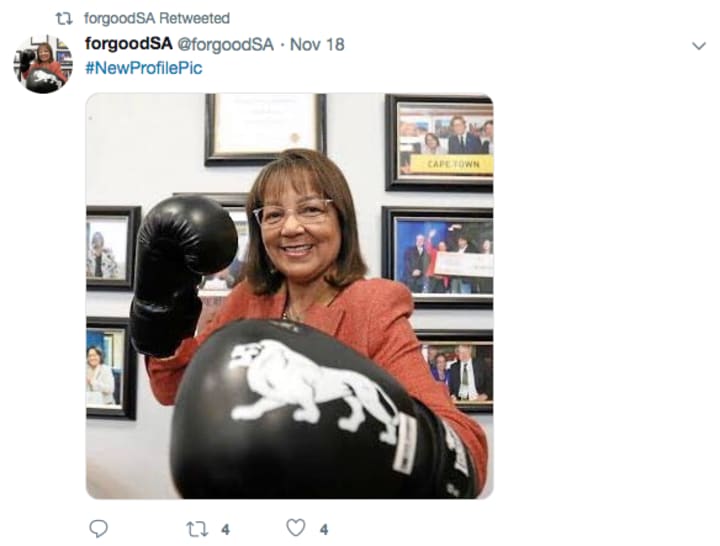
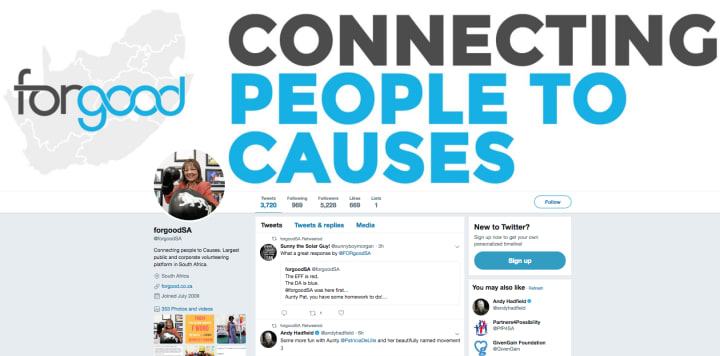
https://twitter.com/forgoodSA
Now, de Lille has cooperated with the Forgood platform to create a campaign specifically to capitalize on the increased attention that her "For Good" political branding has brought to the social enterprise. The campaign, with the not-so-creative, but fitting name, Patricia de Lille For Good, that is featured at the top of the platform's website, and is detailed on its own page.
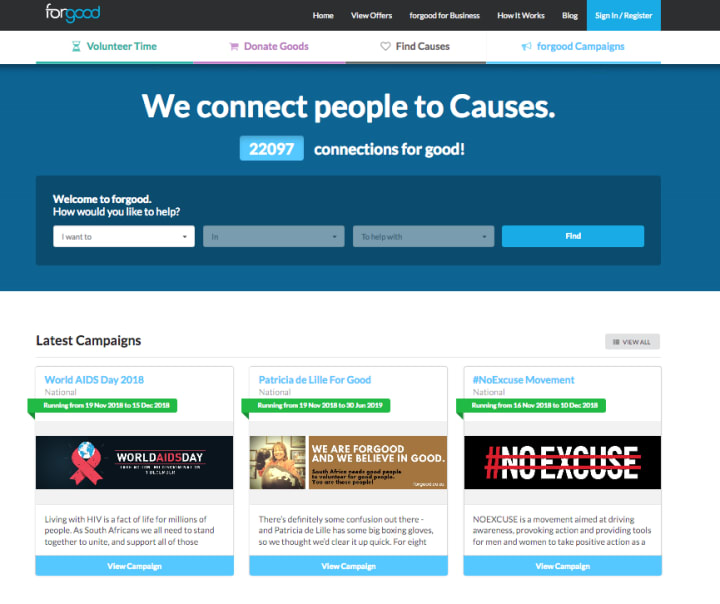
ForGood campaign based on "name confusion"
See https://www.forgood.co.za/campaigns/patricia-de-lille-for-good
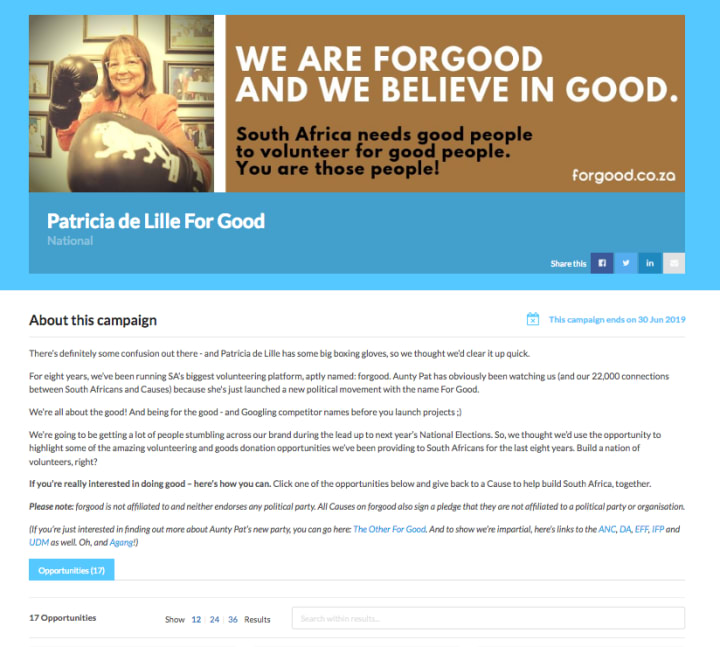
A very well constructed campaign (along with the necessary disclaimers, of course!)
And so in the end, this is a "lesson learned," but not necessarily just the simple one you might have expected at the outset of this story. Yes, you should definitely Google that possible new name—or slate of possible names—that you are considering using. That's a given. However, the real moral and great outcome to be celebrated here is how both the politician and the charitable platform are using this situation—one that might have quickly escalated to litigation, and turning it into a chance to do real good.
Odds are that de Lille's new political party will indeed have a new name—and likely a new web address as well—and soon! And it is likely that given its origin story, this new political movement might just have a future and stand out in a crowded South African political landscape. But for the time that these two entities—one political and one charitable—have been thrust together, they have certainly turned a blunder into one of the best possible outcomes you will ever see in such circumstances. By being willing to admit your mistake—and to "own it," rather than distance yourself from it, Aunty Pat has—inadvertently at first, but quite consciously now—created a really good lesson for us all on how to handle a "DOH!" moment. Well played!
About the Creator
David Wyld
Professor, Consultant, Doer. Founder/Publisher of The IDEA Publishing (http://www.theideapublishing.com/) & Modern Business Press (http://www.modernbusinesspress.com)


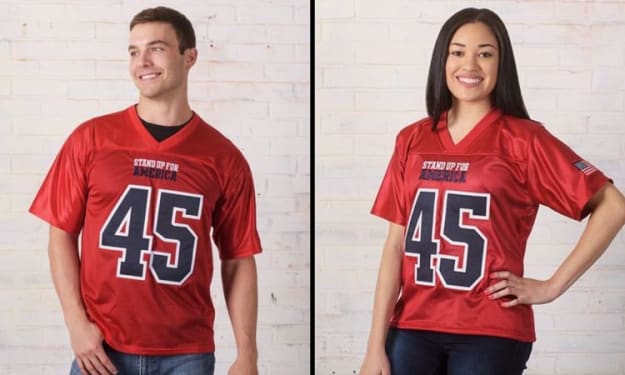



Comments
There are no comments for this story
Be the first to respond and start the conversation.